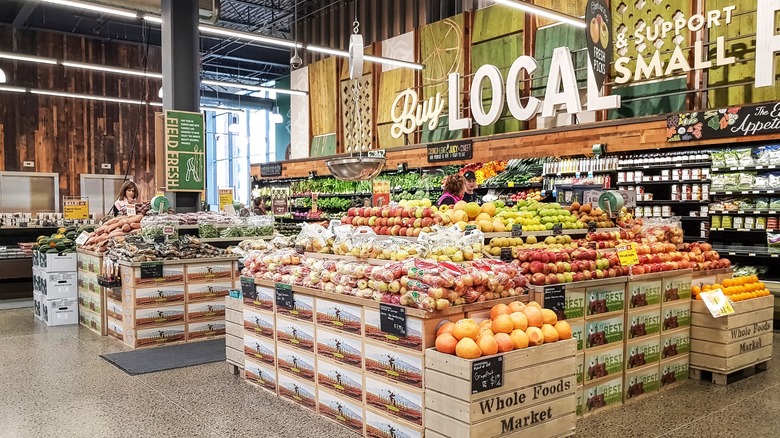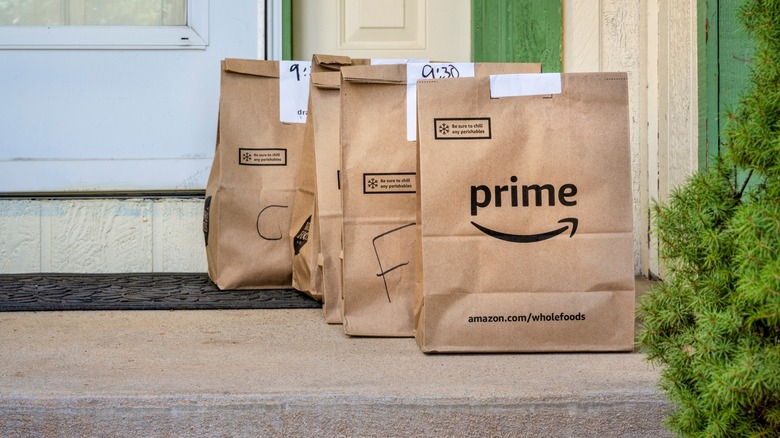Here's What Whole Foods' Yellow And Blue Tags Mean
We may receive a commission on purchases made from links.
The abundance of choice in modern society can make even buying groceries overwhelming. From online shopping to the variety of shops catering to the same clientele, it's almost too much to comprehend. Luckily for those with shopping fatigue, Whole Foods has got you covered. While the organic grocery store contains almost every conceivable department known to man, it also offers deals that make deciding what to buy much easier.
Whole Foods implements an easy-to-understand color coding system. When perusing the aisles, look at the price tags to see what kind of deals may be in store for you. Yellow tags indicate the most far-reaching deals, according to a post by Whole Foods on X, formerly known as Twitter.
Any price tag that has yellow affixed to it indicates an item that is highly discounted. This indicator goes beyond normal deals that Whole Foods may have. It means that the item might be out the door pretty quickly because the product is about to expire or because Whole Foods is discontinuing it. Either way, you will want to get your hands on it fast. Yellow tags apply to anyone shopping in-store. However, discounts offered by blue tags can only be redeemed by certain shoppers.
Certain Whole Foods price tags are exclusive
Apart from cornering the market on media and technology, Amazon also has its hand in groceries. In conjunction with the streaming juggernaut, Whole Foods offers sales specifically for Amazon Prime members. These deals are indicated by blue tags on prices all over the store. For $139 a year, Amazon Prime offers many incentives that can be used online and in the Whole Foods store. Plus, as Whole Foods explains on its website: "Prime members can scan their Whole Foods Market or Amazon app and score an extra 10% off storewide sales. Plus, scan for Prime member deals: special discounts on seasonal favorites throughout the year, chosen for you."
These discounts can also be utilized through the Amazon website. Members can select the Whole Foods dropdown and shop from the comfort of their own home. For a delivery fee of $9.95, Amazon customers can take advantage of member deals, and get their groceries, without ever having to set foot in the store. Amazon is also rumored to offer additional discounts if you visit on certain days of the week, such as Wednesdays. So, even if you aren't a Prime Member, you can look out for discounted items while shopping in-store at those times.
Other ways to save using Amazon Prime
If you are a member, using Amazon Prime benefits online is seamless. All discounts are available and applied when you order for delivery from Whole Foods. But using the same discount in-store is just as easy — and you don't have to pay that pesky service charge.
There are many ways to ensure that you get your discount once you see that blue tag on the item you want to purchase. The Whole Foods Market app is perhaps the most efficient way to apply your savings. After signing in, simply scan the handy barcode available within this app when at the register. You can also connect your phone number to your account for a speedy checkout.
Prime members also get additional benefits, such as 5% back, if they also have a Prime Visa Card. Using this credit card at Whole Foods stores provides savings by crediting back a percentage of goods purchased at the grocery store. Amazon's ownership of Whole Foods also works in reverse. If you want to return something you bought from Amazon, you can also do so at your local market. Just present your personal QR code in-store for an easy way to return items. Whole Foods makes it easier than ever to be a Prime member — whether shoppers are impressed or not with certain amenities.


